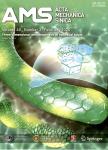Effect of chemical reactivity on the detonation initiation in shock accelerated flow in a confined space
Effect of chemical reactivity on the detonation initiation in shock accelerated flow in a confined space作者机构:State Key Laboratory of Transient Physics Nanjing University of Science and Technology State Key Laboratory of Explosion Science and Technology Beijing Institute of Technology
出 版 物:《Acta Mechanica Sinica》 (力学学报(英文版))
年 卷 期:2013年第29卷第1期
页 面:54-61页
核心收录:
学科分类:08[工学] 0801[工学-力学(可授工学、理学学位)]
基 金:supported by the National Natural Science Foundation of China (10972107) Open Fund of State Key Laboratory of Explosion Science and Technology, Beijing Institute of Technology (KFJJ12-4Y) Jiangsu Innovation Program for Graduate Education (CXLX11 0271)
主 题:Chemical reactivity Reactive shock bifurcation structure ~ Detonation initiation Hot spot Shock wave
摘 要:The interactions of a spherical flame with an incident shock wave and its reflected shock wave in a confined space were investigated using the three-dimensional reactive Navier-Stokes equations, with emphasis placed on the effect of chemical reactivity of mixture on the flame distortion and detonation initiation after the passage of the reflected shock wave. It is shown that the spatio-temporal characteristics of detonation initiation depend highly on the chemi- cal reactivity of the mixture. When the chemical reactivity enhances, the flame can be severely distorted to form a reactive shock bifurcation structure with detonations initiating at different three-dimensional spatial locations. Moreover, the detonation initiation would occur earlier in a mixture of more enhanced reactivity. The results reveal that the detona- tions arise from hot spots in the unburned region which are initiated by the shock-detonation-transition mechanism.



